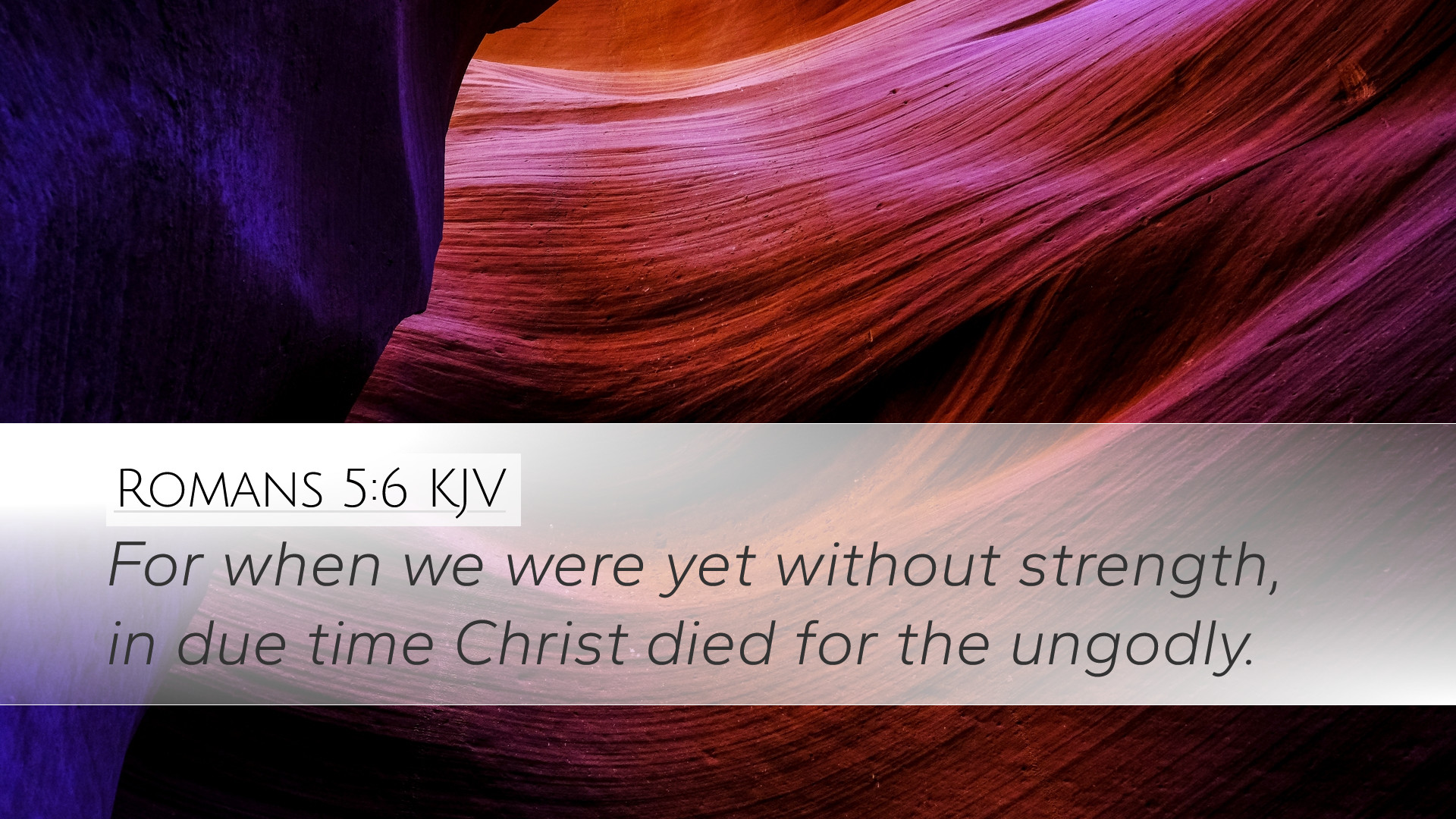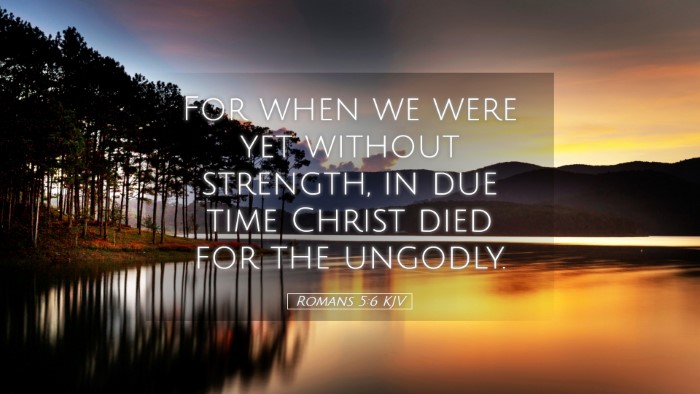Old Testament
Genesis Exodus Leviticus Numbers Deuteronomy Joshua Judges Ruth 1 Samuel 2 Samuel 1 Kings 2 Kings 1 Chronicles 2 Chronicles Ezra Nehemiah Esther Job Psalms Proverbs Ecclesiastes Song of Solomon Isaiah Jeremiah Lamentations Ezekiel Daniel Hosea Joel Amos Obadiah Jonah Micah Nahum Habakkuk Zephaniah Haggai Zechariah MalachiRomans 5:6
Romans 5:6 KJV
For when we were yet without strength, in due time Christ died for the ungodly.
Romans 5:6 Bible Commentary
Commentary on Romans 5:6
Bible Verse: Romans 5:6 - "For when we were yet without strength, in due time Christ died for the ungodly."
Introduction
The Apostle Paul, in the Epistle to the Romans, presents a profound theological argument that culminates in the declaration of God’s grace and salvation through Jesus Christ. Romans 5:6 focuses on the timing and necessity of Christ’s sacrificial death for humanity, particularly noting our condition and God's initiative in redemption.
Contextual Background
In the preceding chapters, Paul establishes a foundational understanding of sin, justification, and the grace of God. Romans 5 marks a transition that highlights the benefits of justification by faith. Here Paul elucidates the state of human weakness and divine intervention.
Commentary Insights
1. The State of Humanity
Matthew Henry: Paul asserts that at the time when Christ died, humanity was "without strength." This denotes a profound spiritual impotence. The commentary emphasizes that human beings are unable to save themselves; they lack the inherent strength to bridge the gap between their sinful nature and a holy God.
Albert Barnes: He elaborates on this 'lack of strength' as not merely physical impotence but a spiritual deathliness. Humanity stands condemned and powerless against sin and death, clearly illustrating the depth of our depravity and need for a Savior.
Adam Clarke: Clarke, too, emphasizes that this state of helplessness is universal, affecting every person without exception. He notes that this context is crucial to understanding the grace offered by Christ and reminds us that it is in this state of weakness that divine strength is made manifest.
2. The Timeliness of Christ’s Sacrifice
Matthew Henry: The phrase "in due time" underscores the providential timing of Christ’s arrival. It was not arbitrary; rather, it was according to God’s plan and purpose. The sacrificial work of Christ was perfectly timed to coincide with human need.
Albert Barnes: He points out that "due time" indicates the scheduled point in redemptive history where God, in His sovereignty, chose to send Christ. Paul emphasizes that Christ’s death was not a mere reaction to human sin but a preordained event that manifested God’s love and justice simultaneously.
Adam Clarke: Clarke further notes that this timely action emphasizes the notion of God’s love being proactive. Christ died not only at the right time but for a purpose, which is to fulfill the need of the ungodly, thus reinforcing that God’s plan for salvation operates within a framework of divine timing.
3. The Immediacy of Divine Action
Matthew Henry: The commentary suggests that God's willingness to send Christ for the ungodly demonstrates the immediacy of His grace. The death of Christ for sinners is a powerful testament to the love that moves before us, seeking to redeem even the most unworthy.
Albert Barnes: He emphasizes that this action speaks to God's character. God does not wait for humanity to become worthy, but He acts in grace while we are still ungodly. This is a cornerstone of the Gospel message—He loves us in our sin.
Adam Clarke: Further, Clarke asserts that Christ’s death was essential not simply for redemption but as an act that demonstrates the compassion of God towards humanity. The ungodly represents the lost condition of mankind, and Christ's sacrificial death is the answer to that lostness.
4. The Nature of God's Love
Matthew Henry: It is essential to understand that God's love is unmerited. Henry articulates that this love is shown through the act of sacrificing His Son for those who did not deserve it, illustrating the deep grace and mercy of God.
Albert Barnes: Barnes also comments on the nature of this love, delineating it as disinterested love, highlighting that God’s act of sending His Son was motivated by love, not by obligation or expectation of worthiness in humanity.
Adam Clarke: Clarke provides a poignant reflection on the sacrificial nature of love. He states that love reaches its greatest expression in giving oneself up for the unworthy. This highlights the profound truth of the Gospel—that Christ’s love is unconditional and sacrificial.
Theological Reflections
This verse encapsulates key theological themes: the desperation of human sinfulness, the necessity of divine intervention through Christ, and the unconditional nature of God's love toward the ungodly.
- The Depth of Human Sin: Romans 5:6 reminds believers that recognizing human frailty is essential for experiencing God’s grace. It points to the necessity of humility in coming to Christ.
- God's Initiative in Salvation: The initiative taken by God in sending His Son is a cornerstone of Christian faith and reflects the heart of the Gospel.
- The Nature of Redemptive Love: Understanding the breadth of God's love encourages believers to extend that love to others, fulfilling the command to love as Christ loved us.
Practical Application
For pastors, students, and theologians, Romans 5:6 serves not only as a theological exposition but as a practical guide. Here are a few applications:
- Evangelism: This verse can inspire a deeper understanding of the urgency and necessity of preaching the Gospel, emphasizing that it is not the righteous, but the ungodly who are in need of salvation.
- Personal Reflection: Believers are encouraged to reflect on their saved state, recognizing what they have been saved from, which fosters gratitude and humility.
- Encouragement in Suffering: Understanding Christ’s sacrifice enables believers to provide hope to those who feel weak and helpless, affirming that God meets us in our struggles.
Conclusion
Romans 5:6 effectively encapsulates the essence of the Gospel message: Christ’s death for the ungodly unfolds the profound depth of God’s love and grace. By recognizing our own helplessness and the timely provision of a Savior, we enter a deeper understanding of the transformative power of the Gospel that motivates our faith and practice.


